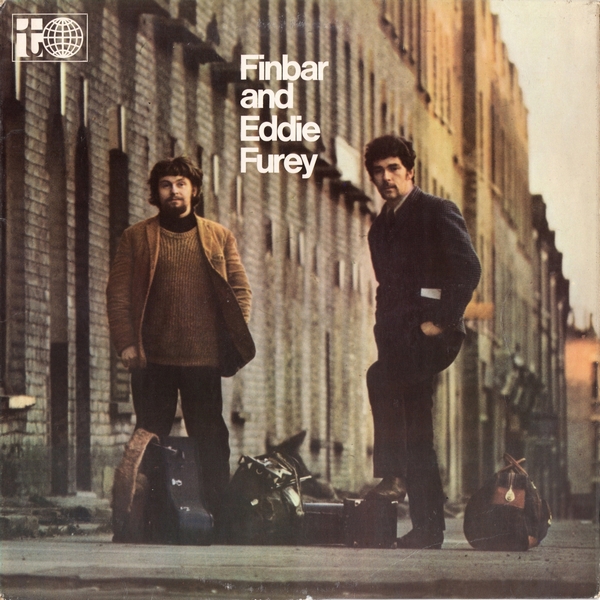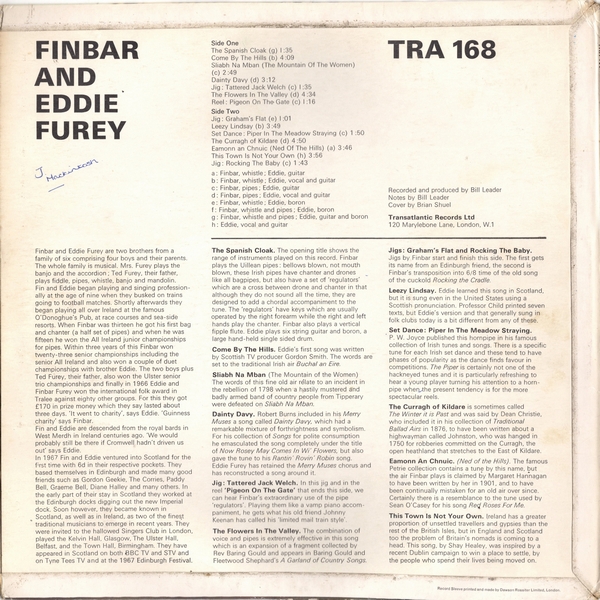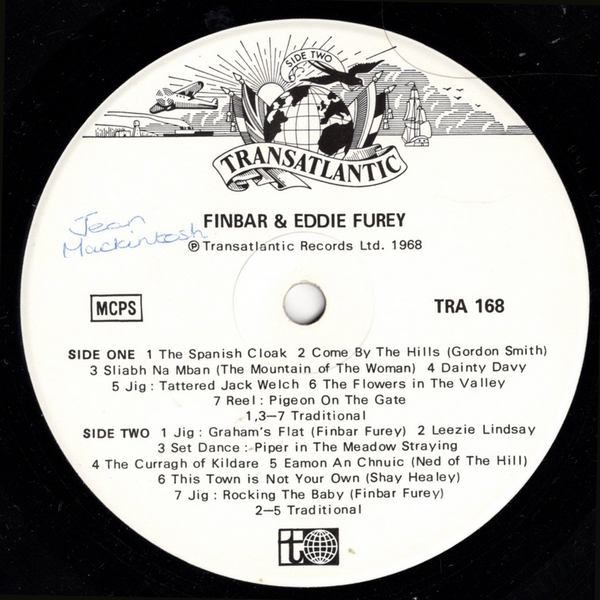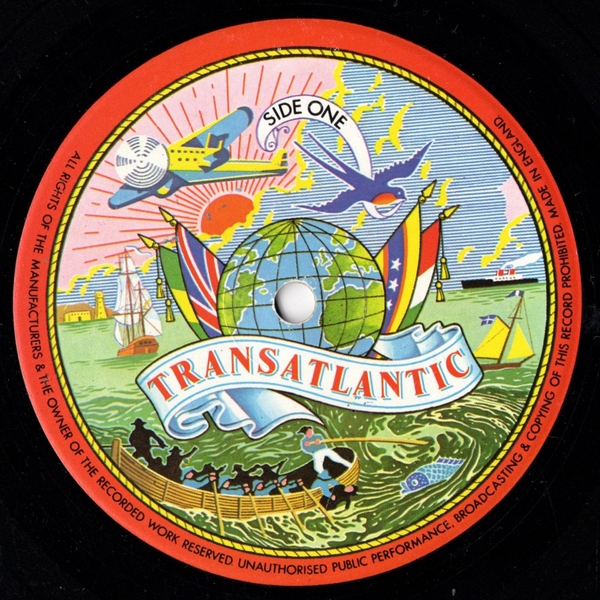

 |



|
Sleeve Notes
Finbar and Eddie Furey are two brothers from a family of six comprising four boys and their parents. The whole family is musical. Mrs. Furey plays the banjo and the accordion; Ted Furey, their father, plays fiddle, pipes, whistle, banjo and mandolin. Fin and Eddie began playing and singing professionally at the age of nine when they busked on trains going to football matches. Shortly afterwards they began playing all over Ireland at the famous O'Donoghue's Pub, at race courses and sea-side resorts. When Finbar was thirteen he got his first bag and chanter (a half set of pipes) and when he was fifteen he won the All Ireland junior championships for pipes. Within three years of this Finbar won twenty-three senior championships including the senior All Ireland and also won a couple of duet championships with brother Eddie. The two boys plus Ted Furey, their father, also won the Ulster senior trio championships and finally in 1966 Eddie and Finbar Furey won the international folk award in Tralee against eighty other groups. For this they got 170 in prize money which they say lasted about three days. 'It went to charity', says Eddie. 'Guinness charity' says Finbar.
Fin and Eddie are descended from the royal bards in West Meath in Ireland centuries ago. 'We would probably still be there if Cromwell hadn't driven us out' says Eddie.
In 1967 Fin and Eddie ventured into Scotland for the first time with 6d in their respective pockets. They based themselves in Edinburgh and made many good friends such as Gordon Geekie, The Corries, Paddy Bell, Graeme Bell, Diane Halley and many others. In the early part of their stay in Scotland they worked at the Edinburgh docks digging out the new Imperial dock. Soon however, they became known in Scotland, as well as in Ireland, as two of the finest traditional musicians to emerge in recent years. They were invited to the hallowed Singers Club in London, played the Kelvin Hall, Glasgow, The Ulster Hall, Belfast, and the Town Hall, Birmingham. They have appeared in Scotland on both BBC TV and STV and on Tyne Tees TV and at the 1967 Edinburgh Festival.
The Spanish Cloak — The opening title shows the range of instruments played on this record. Finbar plays the Uillean pipes: bellows blown, not mouth blown, these Irish pipes have chanter and drones like all bagpipes, but also have a set of 'regulators' which are a cross between drone and chanter in that although they do not sound all the time, they are designed to add a chordal accompaniment to the tune. The 'regulators' have keys which are usually operated by the right forearm while the right and left hands play the chanter. Finbar also plays a vertical fipple flute. Eddie plays six string guitar and boron, a large hand-held single sided drum.
Come By The Hills — Eddie's first song was written by Scottish TV producer Gordon Smith. The words are set to the traditional Irish air Buchal an Eire.
Sliabh Na Mban (The Mountain of the Women) — The words of this fine old air relate to an incident in the rebellion of 1798 when a hastily mustered and badly armed band of country people from Tipperary were defeated on Sliabh Na Mban.
Dainty Davy — Robert Burns included in his Merry Muses a song called Dainty Davy, which had a remarkable mixture of forthrightness and symbolism. For his collection of Songs for polite consumption he emasculated the song completely under the title of Now Rosey May Comes In Wi' Flowers, but also gave the tune to his Rantin' Rovin' Robin song. Eddie Furey has retained the Merry Muses chorus and has reconstructed a song around it.
Jig: Tattered Jack Welch — In this jig and in the reel 'Pigeon On The Gate' that ends this side, we can hear Finbar's extraordinary use of the pipe 'regulators'. Playing them like a vamp piano accompaniment, he gets what his old friend Johnny Keenan has called his 'limited mail train style'.
The Flowers In The Valley — The combination of voice and pipes is extremely effective in this song which is an expansion of a fragment collected by Rev Baring Gould and appears in Baring Gould and Fleetwood Shephard's A Garland of Country Songs.
Jigs: Graham's Flat and Rocking The Baby — Jigs by Finbar start and finish this side. The first gets its name from an Edinburgh friend, the second is Finbar's transposition into 6/8 time of the old song of the cuckold Rocking the Cradle.
Leezy Lindsay — Eddie learned this song in Scotland, but it is sung even in the United States using a Scottish pronunciation. Professor Child printed seven texts, but Eddie's version and that generally sung in folk clubs today is a bit different from any of these.
Set Dance: Piper In The Meadow Straying — P. W. Joyce published this hornpipe in his famous collection of Irish tunes and songs. There is a specific tune for each Irish set dance and these tend to have phases of popularity as the dance finds favour in competitions. The Piper is certainly not one of the hackneyed tunes and it is particularly refreshing to hear a young player turning his attention to a hornpipe when the present tendency is for the more spectacular reels.
The Curragh of Kildare is sometimes called The Winter it is Past and was said by Dean Christie, who included it in his collection of Traditional Ballad Airs in 1876, to have been written about a highwayman called Johnston, who was hanged in 1750 for robberies committed on the Curragh, the open heathland that stretches to the East of Kildare.
Eamonn An Chnuic (Ned of the Hills) — The famous Petrie collection contains a tune by this name, but the air Finbar plays is claimed by Margaret Hannagan to have been written by her in 1 901, and to have been continually mistaken for an old air over since. Certainly there is a resemblance to the tune used by Sean O'Casey for his song Red Roses For Me.
This Town Is Not Your Own — Ireland has a greater proportion of unsettled travellers and gypsies than the rest of the British Isles, but in England and Scotland too the problem of Britain's nomads is coming to a head. This song, by Shay Healey, was inspired by a recent Dublin campaign to win a place to settle, by the people who spend their lives being moved on.